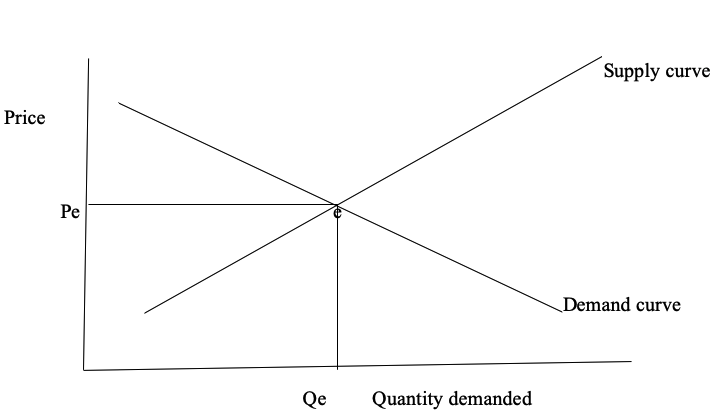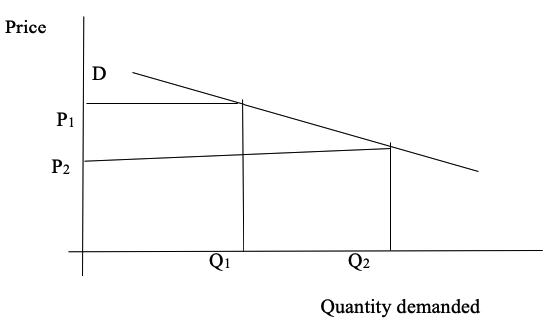This paper is about Oracle Corporation. The Oracle Systems Limited (Dubai) moved its operations to the UAE due to the fall of its sales in the American market in a bid to join other world-leading companies who have diversified their operations to Dubai. The company deals with system development and content management.
Analysis of the firm’s supply and demand for content management
The factors that affect demand includes the price of the commodity, price of other related commodities, taste, and preferences of the consumer, income of the consumer, consumers’ future expectation of change in price, number of customers, technology, cost of production, and government policy (Knoop 75). The factors result in a fall in the companies’ sales due to low consumer demand for its commodities.
When the demand for a product by the consumer is low, the consequent effect is that the price of those commodities will be high. The demand curve of the commodities of Oracle Systems Limited will shift downwards. This means that the price of the commodities will below. The decrease in consumers’ income is the cause of the fall for commodities demanded. Most of the companies are facing the challenges of the financial crisis, prompting them to lay off some of its workers. When the worker loses its employment, it means that his/her income decreases. The purchasing power of the consumer will provide below. This means that the consumer will only be in a position of demanding fewer goods. With the fall in price and quantity demanded of the commodities of Oracle Systems Limited, the company will only be in a position to make minimal and times no profit at all. The fall in the company’s income will force it out of the market in search of growing markets like UAE (Hubbard and O’Brien 47).
The paper continues to mention factors such as taste and preferences as the factors that determine the number of goods demanded by the individuals. The company is hoping to increase its revenue due to high demands that result from an increase in consumer income and the change in the consumer’s tastes. The consumers of UAE have developed a taste and preference for foreign goods since they look at it as fashionable.

With the absence of government intervention in the market, the forces of demand and supply determine the prices of various commodities. In that case, the market is at equilibrium at point e, where demand is equal to supply. At point e, Pe is the equilibrium price of the Oracles products, and Qe is the amount of quantity demanded of the products. Factors such as consumer’s income, government policy, price of other commodities, and tastes and preferences affect demand, resulting in excess demand or low demand (Mankiw 84). The quantity demanded units are more than quantity supplied and vice versa. This means that fewer Oracle products will be produced by the industry as compared to those required by the consumers. This will create deficiencies in the market. It may eventually result in the demise of the industry due to the high cost of production per unit.
With the introduction of a cheap, new, and satisfying type of programming, the resulting effect will be an increase in the number of products being demanded to translate to an increased supply of the same by the industry. At last, the industry will be able to increase its revenues and profits because of the reduced cost per unit of the products. The supply curve will shift downwards, indicating an increase in quantity supplied for the market to be in equilibrium (Cukierman, Zvi, and Leonardo 65).
The paper also talks of the government’s efforts to ensure that it encourages consumption among its citizens and the government step to remove trade restrictions. On the other hand, this plays an important role in determining the number of goods supplied in the market by both foreign and local industries. For instance, most of the products traded by Oracle Corporations are manufactured in UAE. Therefore, with the growing customer purchasing power and change in tastes and preferences, the demand for the goods will be high, requiring the producing companies to increase the number of quantities they produce. With good government policies, the supply can shift outwards, meaning that the price of commodities has increased. The government will benefit through an increase in its revenue collected from the taxes paid by the companies and in terms of the growth in the consumer market.
Analysis of the Price Elasticity of Demand for Content Management
The price elasticity of the product is elastic. This implies that a change in price for content management equally results in the change for quantity demanded of the product.

The PED implies that a proportionate change in price leads to a more proportionate change in quantity demanded.
Works Cited
Cukierman, Alex, Zvi Hercowitz and Leonardo Leiderman. Political economy, growth, and business cycles. Cambridge, Mass.: MIT Press, 1992. Print.
Frank, Robert H., and Ben Bernanke. Principles of economics. Boston, Mass.: McGraw-Hill/Irwin, 2001. Print.
Hubbard, Glenn and O’Brien Patrick. Economics. London: Pearson Prentice Hall, 2009. Print.
Knoop, Todd A.. Recessions and depressions: understanding business cycles. Westport, Conn.: Praeger, 2004. Print.
Mankiw, N. Gregory. Principles of Economics. New York: Southwestern, 2009. Print.